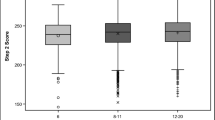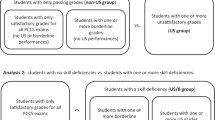Abstract
The Accreditation Council for Graduate Medical Education’s Next Accreditation System requires training programs to demonstrate that fellows are achieving competence in medical knowledge (MK), as part of a global assessment of clinical competency. Passing American Board of Internal Medicine (ABIM) certification examinations is recognized as a metric of MK competency. This study examines several in-training MK assessment approaches and their ability to predict performance on the ABIM Hematology or Medical Oncology Certification Examinations. Results of a Hematology In-Service Examination (ISE) and an Oncology In-Training Examination (ITE), program director (PD) ratings, demographic variables, United States Medical Licensing Examination (USMLE), and ABIM Internal Medicine (IM) Certification Examination were compared. Stepwise multiple regression and logistic regression analyses evaluated these assessment approaches as predictors of performance on the Hematology or Medical Oncology Certification Examinations. Hematology ISE scores were the strongest predictor of Hematology Certification Examination scores (β = 0.41) (passing odds ratio [OR], 1.012; 95 % confidence interval [CI], 1.008–1.015), and the Oncology ITE scores were the strongest predictor of Medical Oncology Certification Examination scores (β = 0.45) (passing OR, 1.013; 95 % CI, 1.011–1.016). PD rating of MK was the weakest predictor of Medical Oncology Certification Examination scores (β = 0.07) and was not significantly predictive of Hematology Certification Examination scores. Hematology and Oncology ITEs are better predictors of certification examination performance than PD ratings of MK, reinforcing the effectiveness of ITEs for competency-based assessment of MK.

Similar content being viewed by others
References
Swing SR (2007) The ACGME outcome project: retrospective and prospective. Med Teach 29:648–654
Accreditation Council for Graduate Medical Education. ACGME common program requirements. Approved September 28, 2014. http://www.acgme.org/acgmeweb/Portals/0/PFAssets/ProgramRequirements/CPRs_07012015.pdf. Accessed October 19, 2015
Nasca TJ, Philibert I, Brigham T, Flynn TC (2012) The next GME accreditation system—rationale and benefits. N Engl J Med 366(11):1051–1056
Collichio FA, Kayoumi KM, Hande KR, Hawkins RE, Hawley JL, Adelstein DJ, D’Angelo JM, Stewart JA (2009) Developing an in-training examination for fellows: the experience of the American Society of Clinical Oncology. J Clin Oncol 27(10):1706–1711
Grossman RS, Fincher R-ME, Layne RD, Seelig CB, Berkowitz LR, Levine MA (1992) Validity of the in-training examination for predicting American Board of Internal Medicine certifying examination scores. J Gen Intern Med 7(1):63–67
Waxman H, Braunstein G, Dantzker D, Goldberg S, Lefrak S, Lichstein E, Ratzan K, Schiffman F (1994) Performance on the internal medicine second-year residency in-training examination predicts the outcome of the ABIM certifying examination. J Gen Intern Med 9(12):692–694
Babbott SF, Beasley BW, Hinchey KT, Blotzer JW, Holmboe ES (2007) The predictive validity of the internal medicine in-training examination. Am J Med 120(8):735–740
Grabovsky I, Hess BJ, Haist SA, Lipner RS, Hawley JL, Woodward S, Cary Engleberg N (2015) The relationship between performance on the infectious diseases in-training and certification examinations. Clin Infect Dis 60(5):677–683
Lohr KM, Clauser A, Hess BJ, Gelber AC, Valeriano-Marcet J, Lipner RS, Haist SA, Hawley JL, Zirkle S, Bolster MB (2015) Performance on the adult rheumatology in-training examination and relationship to outcomes on the rheumatology certification examinations. Arthritis Rheum 67(11):3082–3090
McDonald FS, Zeger SL, Kolars JC (2008) Associations between United States Medical Licensing Examination (USMLE) and Internal Medicine In-Training Examination (IM-ITE) scores. J Gen Intern Med 23(7):1016–1019
Kay C, Jackson JL, Frank M (2015) The relationship between internal medicine residency graduate performance on the ABIM certifying examination, yearly in-service training examinations, and the USMLE Step 1 examination. Acad Med 90(1):100–104
Kolen MJ, Brennan RL (2014) Test equating, scaling, and linking: methods and practices, 3rd edn. Springer, New York, NY
Allen MJ, Yen WM (1979) Validity. In: Introduction to measurement theory, 1st edn. Wadsworth, Inc., Belmont, CA, pp 95–117
The Internal Medicine Subspecialty Milestones Project. A joint initiative of the Accreditation Council for Graduate Medical Education and the American Board of Internal Medicine in collaboration with the Alliance for Academic Internal Medicine and the Association of Specialty Professors. http://www.acgme.org/acgmeweb/Portals/0/PDFs/Milestones/InternalMedicineSubspecialtyMilestones.pdf. July 2015. Accessed October 17, 2015
Lipner RS, Hess BJ, Phillips RL Jr (2013) Specialty board certification in the United States: issues and evidence. J Contin Educ Health Prof 33(Suppl 1):S20–S35
American Society of Hematology. Resources for training program directors. Hematology-Oncology Curricular Milestones. http://www.hematology.org/Educators/Training-Directors/2720.aspx. Accessed October 10, 2015
American Society of Clinical Oncology. ASCO and ASH present: the Hematology-Oncology Curricular Milestones. http://www.asco.org/sites/www.asco.org/files/ho_curricular_milestones_4.18.14_final.pdf. 2015. Accessed October 17, 2015
Collichio F, Kayoumi K, Sierra L, Clayton CP, Raymond M, Muchmore EA (2015) The Next Accreditation System: a strategy for implementing new reporting standards using a hematology/oncology model. Am J Med 128(2):200–7
Holmboe ES, Wang Y, Meehan TP, Tate JP, Ho S-Y, Starkey KS, Lipner RS (2008) Association between maintenance of certification examination scores and quality of care for medicare beneficiaries. Arch Intern Med 168(13):1396–1403
Norcini JJ, Webster GD, Grosso LJ, Blank LL, Benson JA Jr (1987) Ratings of residents’ clinical competence and performance on certification examination. J Med Educ 62:457–462
Acknowledgments
The authors wish to thank Lyndsey R. Sierra of the American Society of Clinical Oncology for her contributions for getting this research project initiated and for facilitating our access to the data used in this study.
Author information
Authors and Affiliations
Corresponding author
Ethics declarations
Institutional Review Board Approval
This study was approved (determined to be “exempt” status) by IRB 00000436 of the American Institutes for Research, Washington, D.C.
Conflict of Interest
The study represents original work, and all authors meet the criteria for authorship and accept responsibility for the scientific content of the manuscript. Dr. Hess is a former employee of the American Board of Internal Medicine (ABIM) and is currently a consultant for ABIM. Ms. Duhigg and Dr. Lipner are employees of the ABIM. Dr. Haist, Dr. Morrison, and Ms. Hawley are employees of the National Board of Medical Examiners, which is contracted to develop and score both the hematology in-service examination and the medical oncology in-training examination. Mr. Clayton and Ms. Kayoumi are employees of the American Society of Hematology. Dr. Raymond was formerly an employee of the American Society of Clinical Oncology. Dr. Muchmore is a volunteer for the ACGME, by serving on the Residency Review Committee-Internal Medicine (RRC-IM). After data collection was completed for this study, Dr. Gitlin was appointed to a position on the Hematology Board of the American Board of Internal Medicine.
Electronic supplementary material
Below is the link to the electronic supplementary material.
Supplementary Material 1
(DOCX 17 kb)
Supplementary Material 2
(DOCX 144 kb)
Rights and permissions
About this article
Cite this article
Collichio, F.A., Hess, B.J., Muchmore, E.A. et al. Medical Knowledge Assessment by Hematology and Medical Oncology In-Training Examinations Are Better Than Program Director Assessments at Predicting Subspecialty Certification Examination Performance. J Canc Educ 32, 647–654 (2017). https://doi.org/10.1007/s13187-016-0993-6
Published:
Issue Date:
DOI: https://doi.org/10.1007/s13187-016-0993-6




